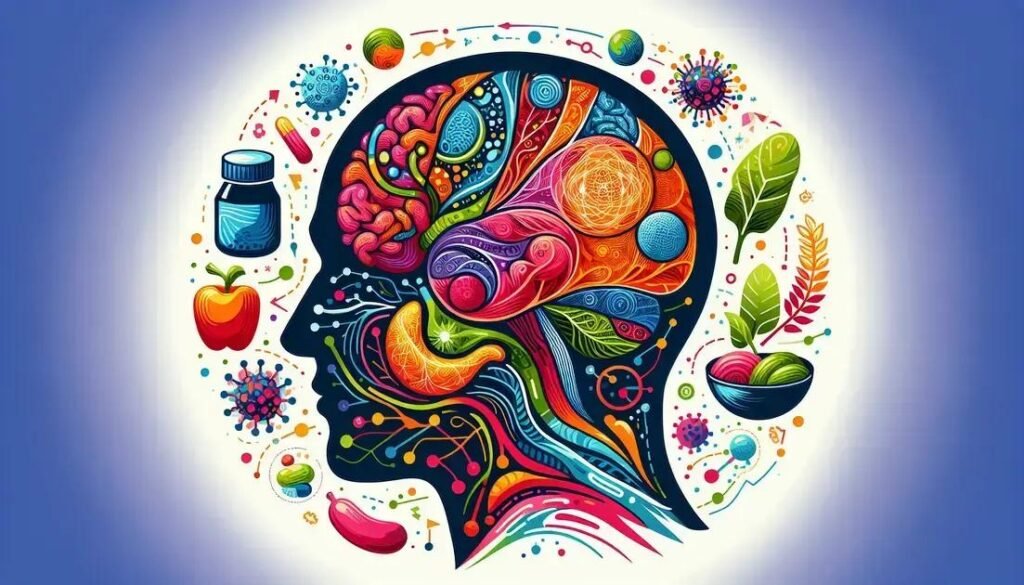The fascinating world of gut-brain connection is gaining popularity, and for good reason. Research has shown that the health of your gut can have a profound impact on your mental wellbeing.
In this article, we’ll delve into the surprising link between gut health and mental well-being, and explore the benefits of harnessing the power of gut-brain connection.
With 70% of your immune system located in your gut, it’s no wonder that a healthy gut can lead to improved mental clarity, reduced stress, and increased overall wellbeing.
Let’s take a closer look at the gut-brain connection and how you can start to experience these benefits for yourself.
Gut-Brain Connection: A Hidden Key to Mental Wellness
The gut-brain connection is a complex relationship that has been gaining attention in recent years. Research has shown that the health of your gut microbiome has a profound impact on your mental wellbeing, from influencing your mood and cognitive function to affecting your stress levels and emotional regulation.
The connection between the gut and brain is facilitated by the vagus nerve, which allows for bidirectional communication between the two. This communication is crucial for maintaining overall health and wellbeing.
In this article, we’ll explore the fascinating world of gut-brain connection, examining the latest research and practical tips for harnessing the benefits of this powerful relationship.
The Gut-Brain Axis: How Gut Bacteria Affects Your Mind
The gut-brain axis is a bidirectional communication network between the central nervous system and the enteric nervous system in the gut.
Gut bacteria play a crucial role in this axis, producing neurotransmitters and hormones that influence mood, cognitive function, and emotional regulation.
The diversity of gut bacteria, known as the gut microbiome, is closely linked to mental wellbeing, with studies showing that altered gut bacteria profiles are associated with conditions such as depression, anxiety, and irritable bowel syndrome.
Understanding how gut bacteria affects the brain is essential for developing new treatments and therapies for mental health disorders.
Understanding the Gut-Brain Connection
The gut-brain connection is a complex network of interactions between the central nervous system, the enteric nervous system in the gut, and the microbiome of gut bacteria. This intricate relationship is facilitated by the vagus nerve, which allows for bidirectional communication between the brain and the gut.
The gut microbiome plays a crucial role in producing neurotransmitters and hormones that influence mood, cognitive function, and emotional regulation. In this article, we will delve into the mechanisms of the gut-brain connection, examining the latest research and exploring the implications for mental wellbeing.
Gut Health and Mental Wellbeing: What’s the Connection?
Gut health and mental wellbeing are intricately linked, with the gut microbiome playing a crucial role in producing neurotransmitters and hormones that influence mood, cognitive function, and emotional regulation.
Research has shown that an imbalance of gut bacteria, also known as dysbiosis, is associated with various mental health disorders, including depression, anxiety, and bipolar disorder.
Conversely, probiotics and prebiotics have been shown to have a positive impact on mental wellbeing, reducing symptoms of depression and anxiety.
In this article, we’ll explore the connection between gut health and mental wellbeing, examining the latest research and exploring the implications for mental health treatment.
The Impact of Gut-Brain Connection on Mental Health
The gut-brain connection has a significant impact on mental health, influencing symptoms of anxiety, depression, and other mental health disorders.
Research has shown that alterations in the gut microbiome, such as those caused by antibiotic use or a high-fat diet, can lead to changes in brain function and behavior.
Furthermore, studies have demonstrated that gut bacteria produce neurotransmitters and hormones that play a crucial role in regulating mood, appetite, and sleep.
In this article, we’ll explore the impact of the gut-brain connection on mental health, examining the latest research and discussing the potential implications for mental health treatment.
Unlocking the Power of Gut-Brain Connection
Unlocking the power of the gut-brain connection requires a comprehensive understanding of the complex interactions between the gut microbiome, the enteric nervous system, and the central nervous system.
By exploring the latest research and breakthroughs in this field, we can gain a deeper understanding of the ways in which the gut microbiome influences mental wellbeing and develop new strategies for promoting mental health and resilience.
In this article, we’ll delve into the latest advancements in gut-brain research and explore the potential applications of this knowledge in the field of mental health.
Frequently Asked Questions about Gut-Brain Connection
What is the gut-brain connection?
The gut-brain connection refers to the complex relationship between the gut microbiome, the enteric nervous system, and the central nervous system. Research has shown that the gut microbiome produces neurotransmitters and hormones that influence mood, cognitive function, and emotional regulation.
How does the gut microbiome affect mental health?
The gut microbiome has been shown to play a crucial role in mental health, influencing symptoms of anxiety, depression, and other mental health disorders. Alterations in the gut microbiome, such as those caused by antibiotic use or a high-fat diet, can lead to changes in brain function and behavior.
What are the benefits of probiotics and prebiotics?
Probiotics and prebiotics have been shown to have a positive impact on mental wellbeing, reducing symptoms of depression and anxiety. Probiotics can help restore the balance of the gut microbiome, while prebiotics can help feed the good bacteria in the gut.
Can the gut-brain connection be influenced by diet and lifestyle?
Yes, diet and lifestyle can have a significant impact on the gut-brain connection. A diet rich in fiber and fermented foods, combined with regular exercise and stress management, can help promote a healthy gut microbiome and support mental wellbeing.
Is the gut-brain connection a new area of research?
No, the study of the gut-brain connection is a rapidly growing field of research, with new breakthroughs and discoveries being made regularly. Researchers are working to better understand the complex interactions between the gut microbiome, the enteric nervous system, and the central nervous system.
Can the gut-brain connection be used to treat mental health disorders?
Yes, research is ongoing to explore the potential of the gut-brain connection as a treatment for mental health disorders. By targeting the gut microbiome and promoting a healthy balance of bacteria, researchers hope to develop new and effective treatment options.



